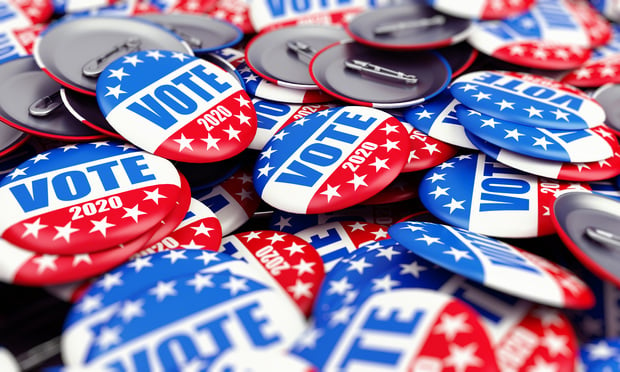 Vote 2020 buttons.
Vote 2020 buttons.The protection of America’s electoral democracy during the pandemic onslaught requires a two-pronged strategy: the practice of social distancing at the polls on Election Days and the adoption of new methods of remote ballot access for voters. Meeting this unprecedented challenge will require significant changes in current law and practice.
Gov. Lamont began to address the first prong on March 19 when he issued Executive Order No. 7 to postpone the state’s presidential primary elections from April 28 to June 2.
Citing “a compelling interest in reducing the risk of transmission of COVID-19 among voters, poll workers, and residents, which risk would be heightened in the settings of indoor polling places and potential lines for voting, especially in polling places such as senior centers, schools, community centers, and other public facilities,” the Governor announced:
“Under my sole authority pursuant to the declaration of public health and civil preparedness emergency, and to protect the health and safety of voters, poll workers, and the most vulnerable members of our population, I hereby modify Section 9-464 of the Connecticut General Statutes to provide that on June 2, 2020 each party shall conduct a primary in each town if the names of two or more candidates for President of the United States are to be placed on such party’s ballot m accordance with the provisions of chapter 154 of the General Statutes.”
The same “compelling interest” that justified the delay in the primary also provides the legal justification for assuring a new method of the right to vote both in June and, more importantly, in November. That is why we call on Governor Lamont to issue a new Executive Order to allow universal “no excuse” absentee or mail-in balloting for both the upcoming primary and for the November general election.
We believe the legal authority plainly exists for the Governor to issue such a new Executive Order. The constitutional mandate is set forth in the “Free Suffrage” provision of the State Constitution, found in Article Sixth, Sec. 4, which authorizes the state government to protect the right to vote:
“Laws shall be made to support the privilege of free suffrage, prescribing the manner of regulating and conducting meetings of the electors, and prohibiting, under adequate penalties, all undue influence therein, from power, bribery, tumult and other improper conduct.”
It is hard to imagine a clearer and more unambiguous constitutional directive for taking positive steps to secure the franchise in the face of a public health emergency.
A second strong constitutional basis for an executive order can be found in Article Sixth, Sec. 7 of the Connecticut Constitution. Under this section:
“The general assembly may provide by law for voting in the choice of any officer to be elected or upon any question to be voted on at an election by qualified voters of the state who are unable to appear at the polling place on the day of election because of absence from the city or town of which they are inhabitants or because of sickness or physical disability or because the tenets of their religion forbid secular activity.”
The General Assembly has chosen to give the narrowest possible construction of this authority by requiring in C.G.S. Sec. 9-135 that the “sickness or disability” be the “his or her illness” of the voter as a precondition for issuance of an absentee ballot. However, the language appears to permit a more general reading to cover illness arising from a public pandemic in which the “sickness or disability” infects not just an individual voter but applies to large segments of the population as well.
The public health emergency powers that authorized the Governor to modify C.G.S. Sec. 9-464 to change the date of the primary elections in 2020 also authorizes him to modify C.G.S. Sec. 9-135 to change the procedures for utilization of paper absentee ballots in response to the state’s “compelling interest” in reducing the risk of illness and the state’s constitutional mandate to protect the right to vote.
In addition, the Governor should modify the election law to permit an on-line application process for an absentee ballot so that voters do not need to appear at their Town Clerk’s office in person to make a request, as is the case now in most circumstances.
It is prudent to assume there is no reasonable possibility that the threat to public health will have abated sufficiently to rely solely on in-person polling place voting for the June primary. Therefore, the shift to no-excuse absentee and mail-in ballot approval will be needed soon. And if that is the case, we can see no reason not to declare at the same time that the same new procedures should also be followed on Election Day in November. Such early notice to voters will be reassuring that elections will not be cancelled. It will give Registrars of Voters enough time to train poll workers and to put in place verification and ballot counting procedures to assure the integrity of the vote count.
If it would promote non-partisan acceptance of the new voting procedures, we would not find it objectionable if the changes were applied on a temporary basis only during the current health emergency.
Finally, Connecticut will have an opportunity to apply some of its share of the $400 million of new federal funding from the Families First legislation approved in April for states to modernize and add security to their voting procedures. Our state should take advantage of these new federal funds to make the shift to no excuse absentee mail in voting on a statewide basis.
"allow" - Google News
May 29, 2020 at 09:36AM
https://ift.tt/3gAuW6j
Allow Vote by Mail For Elections in Connecticut | Connecticut Law Tribune - Law.com
"allow" - Google News
https://ift.tt/2KTEV8j
https://ift.tt/2Wp5bNh
Bagikan Berita Ini















0 Response to "Allow Vote by Mail For Elections in Connecticut | Connecticut Law Tribune - Law.com"
Post a Comment